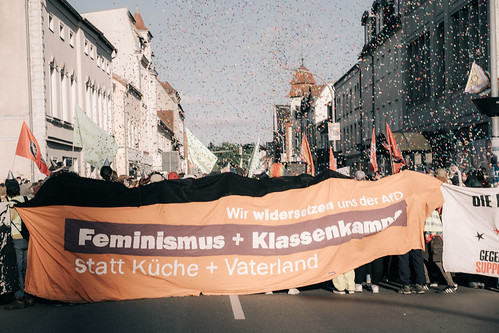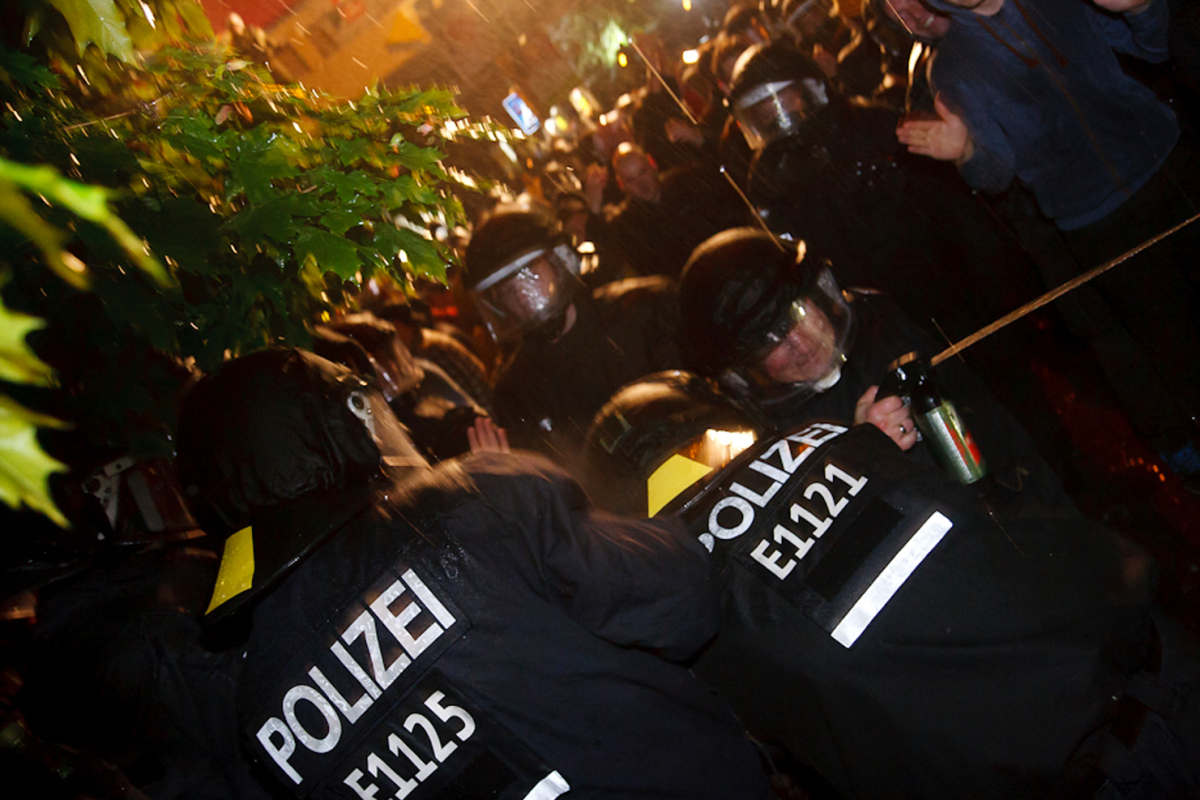An Establishment Fascist?
Eric Zemmour has a storied history of racial incitement, proposing outrageously hostile policies against Muslim immigrants to prevent the “reverse colonisation” of France, and he is a staunch defender of Vichy France. Despite this, writers such as Philippe Marliere contend that designating him as a fascist is un-rigorous analysis. The crux of this refutation is that unlike the Le Pen clan, Zemmour has been a mainstay of French cultural-political life, readily welcomed by the French establishment. Whereas Jean-Marie Le Pen was treated as a vulgar outcast, Eric Zemmour was based within French conservative media outlets such as Le Figaro and CNews (France’s equivalent of Fox News). Zemmour is an Algerian Jew of Berber stock, and a pied noir, a common name for European and non-Arab settlers of Algeria. Furthermore, he has expressed an admiration of the Communist Party of France and its former leader Georges Marchais.
Comparison with one clear example of fascism today, that of India under the Bharatiya Janatiya Party (BJP), makes the contrast very clear. The latter carries markers of the classical definition, lacking in Zemmour. There is no paramilitary organisation like the RSS in France; there is no equivalent rejection of the state’s foundational principles; there is nothing close to state-sanctioned ethno-religious pogroms; and, as already mentioned, there is a deep connection to the French establishment in the case of Zemmour. That did not exist for former roadside tea seller Narendra Modi.
There is however, a common ideological foundation between Zemmour and the BJP. Zemmour articulates an alternate history and promulgates a mythos of a France that was but is no more. This mirrors the nostalgia for a glorious past not unlike fascist politicians. This ideology has parallels with the Hindutva ideological framework developed by Vinayak Damodar Savarkar, the ideological father of the BJP. Clearly, labelling him a fascist in the conventional sense of the word is inadequate. He is ‘fascistic’ but not a ‘classical Fascist’. He is a personality that is amenable to adjectives and adverbs but resistant to nouns.
An Organic Intellectual
I posit that he is an organic intellectual of a modern, distinctly French fascism. He is an ideological founding father who might become comparable in stature to Savarkar. That is destined to be valorised after his death rather than to lead a vanguard fascist movement.
Italy had Mussolini and his blackshirts, Germany had Hitler and the SA (later SS). However France, being on the winning side of World War I, only had a collaborating government under one-time hero Philipe Petain, which lacked both ideology and a vanguard paramilitary movement. Perhaps the mess of contradictions in the story of Eric Zemmour can be explained by a nascent yearning for an abortive French fascism. Zemmour gives voice to this yearning, awakens and mobilises the social base that has been germinating over the decades.
In his essay, ‘The Intellectuals’, Gramsci stated:
“The mode of being of the new intellectual can no longer exist in eloquence, which is an exterior and momentary mover of feelings and passions, but in active participation in practical life, as constructor, organiser, “permanent persuader”, and not just simple orator…”
Zemmour’s successful career within the media and his prolific output matches the description of “permanent persuader”. With self-published twenty books, the most successful (Le Suicide francais) selling over 500,000 copies, he created a body of work. This shapes a grand narrative of French history stretching back to the Treaty of Paris in 1763, ending the Seven Years’ War. In it there are some classic indicators of fascism, namely a warped and convenient interpretation of history. But instead of asserting a Hitlerian view of racial supremacy that will inevitably rise to dominate the world, Zemmour expresses ‘melancholy’ for a France that has withered (one of his books is titled Melancolie francaise). But then we oscillate back to fascist habits of finding traitors within the nation (leftists, feminists, homosexuals, and of course Muslims) and giving anti-materialist explanations such as “the erosion of virility” and the “breakdown of traditional values”.
Such assertions lack rigour, but they represent an earnest intellectualism on the part of Zemmour. While politicians on the right participate in a culture war for their own interests, Zemmour sounds committed to everything he says to the point of self-defeating. His vicious diatribes against Muslims led to multiple convictions for incitement, a truly remarkable achievement in a country where routine Islamophobia is rationalised across the political system in the name of Laïcité. His defence of Vichy deportations of Jews is barely tempered Holocaust denial, which would have consigned any other political figure to obscurity.
This invulnerability further lends credence to the notion that he is not a fascist but rather a product of the French upper class gone wayward: vocalising its most vicious thoughts, sowing seeds in the soil of French political thought already tilled by the Le Pens. He is increasingly unlikely to progress to the runoff now that the attack on Ukraine has precipitated a decline in polls for him due to his past expressions of sympathy towards Russia and repudiation of NATO. However, the mainstreaming of his most radical and violent ideas has surely laid a firm intellectual foundation for a leader to emerge in the future that will lionise him.
Chaos is An International Ladder
The first wave of aberrations created by the period of crises (after 2008) included the rise of: Viktor Orban and Fidesz, Donald Trump, Nigel Farage and UKIP, Matteo Salvini and the Lega Nord, Santiago Abascal and Vox, and of course Marine Le Pen and the National Rally – to name just a few. These political formations conceived of themselves as maverick movements from outside the “established structures of politics”. They claimed those structures had brought ruin to the “native” working class abandoned by the political left in favour of cosmopolitanism. All these parties succeeded in shifting the political zeitgeist. Traditional parties rushed to adopt both their rhetoric and policy prescriptions. Ruling parties portray these capitulations as sensible responses to shifts in public opinion. That process exonerated them from their own role in ploughing the soil for the far-right.
But the initial opportunism of empowering the far-right to facilitate neo-liberal assaults on electorates is beginning to have uncontrollable consequences. The far-right has grown into a sentient movement with its own media infrastructure, extra-parliamentary political action groups, and even its own think tanks. Deviation from far-right orthodoxy by party leadership is seen as treasonous by the rank and file. The revolution is willing to eat its own children.
Politicians from ruling parties expect political dividends in wholeheartedly embracing the far-right, while any attempts to moderate within the far-right political parties risks excommunication. For example, Pablo Casado’s efforts in Spain to turn the Partido Popular (PP) into the older sibling of Vox stands out. However, this manoeuvre did not strengthen the PP, but resulted in a surging support for Vox. Now the PP is propped up electorally by absorbing voters from the now emaciated Ciudadanos. Zemmour may be having the same effect in France.
In her attempts to outmanoeuvre Emmanuel Macron in the French electoral system, Marine Le Pen has moderated some of her most radical positions. This peeled off support from the political base of centre-right les Republicains, but earned her the taunts of being “soft” on Islam from Macron’s party. The process that began with ruling parties that enabled the far-right has now come full circle. An establishment figure like Zemmour can now successfully expand the frontier for the far-right through rhetoric of lost French supremacy, “reverse colonisation”, and sovereigntism.
It is possible that Zemmour is occupying the space Le Pen vacated while Le Pen has absorbed more affluent centre-right voters in her turn towards “moderation”. These questions will be decisively answered after the election. My suspicion is that Zemmour is not peeling away votes from Le Pen as much as he is radicalising the traditional voters of the centre-right. He is, through his intellectual labours, expanding the social base for fascism to succeed in the future as opposed to splitting the far-right vote. Polling suggests that Le Pen will win about the same percentage of the first-round vote as her last attempt. Key indicators to test this hypothesis will be the age, geographical, and class composition of his and Le Pen’s voters on election day.
Prospects for The Future
Climate change, war, dispossession, malnutrition, migration, and disease. These processes follow each other sequentially and synergistically. We cannot imagine the exact nature of the political reaction these processes will spark in the Global North. But we can say with confidence that within a timescale of decades, a full-throated, organised, and violent fascism will emerge. In absence of a pro-active management of these world historic challenges, fascism can and will flourish.
Where will this fascism get its blueprints from? In the US and Canada, neo-Nazism will resonate with the settler colonialism ethos foundational to these states. Italy and Germany have their fascist traditions that serve as readily available templates. The United Kingdom may disintegrate into its constituents and produce an English fascism that, I think, will mirror that of France.
Both France and England suffer from a nostalgia for an all-conquering imperial past (albeit a relatively short lived one under Napoleon for France); and both experienced large influxes of immigrants from former colonies which today are the target of nativist racism. Perhaps Zemmour’s methods and policies will influence an English fascism that lags behind France’s in maturity.
Eric Zemmour provides a blueprint to impose his hyper-assimilationist disciplining of any and every citizen that does not follow his prescriptions of ‘Frenchness’. This is a conventional recipe that Zemmour advocates for using a confected, but original, narrative of French history and culture.
In opposition, Jean-Luc Melenchon’s line of rebuttal appears most promising. He asserts confidently that France is a mongrel culture not a unitary one. Of all the political heavyweights he, and his party La France Insoumise, offer the strongest rejection of Islamophobia and racism. The electoral effects of this are evident in his support from French voters of migrant backgrounds. Melenchon’s radical proposals include the constitution of a Sixth Republic and he articulates an alternative vision of sovereignty in the realms of space, information technology, and the sea. To combat Zemmour-ism, it turns out one needs a counter-narrative of commensurate intellectual depth. Among all French presidential candidates Melenchon has the most depth.
To conclude:
Zemmour is not a fascist but an intellectual persuader-in-chief at the zenith of his career. He is bound to the French state and wants to restore it to perceived past glories. This insular focus on France and restoration is distinct from a fascist desire to create a new and purified machine to project racial dominance. However, ideas can be revised, expanded, refuted or re-envisioned. As world crises proliferate and intensify, Zemmour’s ideas can be foundational for a future fascist messiah. For the left, there is an urgent need to meet this new challenge of a fascistic intellectual of, for, and by the ruling class. Jean-Luc Melenchon’s intellectual labours offer both a glimmer of hope and a template.




